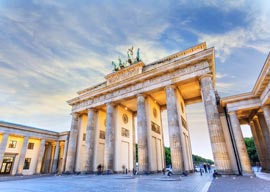
July 12, 2015

Brandenburg Gate, Berlin
Source: Shutterstock
Nor was there any mention of the health benefits of the chemical industry. Suppose the German chemical industry were to shut down tomorrow, what would the costs (to European health alone) be? Almost certainly they would be incomparably greater than the present costs: Imagine life without any of the chemicals that the industry produced. In other words, based on the logic of the article, the rest of Europe owes Germany even more than it pays for the chemicals it buys from it. But the thought of the writer of the article dates from before the development of double-entry bookkeeping. In his world there are only costs, no benefits, except where there are benefits without costs, and which depends very much on a preexisting political stance. You always get the answer you first thought of.
It seems to have escaped the author’s notice that by far the worst places for pollution in France are Paris, Marseille, and Lyon, where (as it happens) there are large concentrations of population. How dastardly clever of the Germans to have polluted precisely the areas where the most people live!
I am far from denying pollution as a serious problem: No one who approaches Marseille, for example, from an empty quarter of France is likely to do that. The pollution makes itself evident in more than one way. First there is the permanent, never-lifting grey-purple-pink haze on the horizon; then there is the smell, that of hydrogen sulfide mixed with other delightful gases”one can even feel the particulate matter in the air. I have approached Marseille overland several times and have always been struck by the horrible quality of its air (to which, however, one soon accommodates).
The pollution is French, though, not German; and as I read the article I could not help but think of the Treaty of Westphalia of 1648, which put an end to the wars of religion on the principle of To every kingdom its religion. To every country, then, its pollution (though I acknowledge that chemicals, like religious doctrines, do not fully recognize political borders).
As every human must know who has ever taken the trouble to examine his own thoughts and emotions, it is much more gratifying to blame others than to blame oneself; and this is especially so in times of extreme difficulty or crisis. Of course, others often are to blame, either wholly or partially; but ascribing the correct degree of such blame, and knowing how useful such ascription is in any given circumstance, requires a clear head and an honest heart. In other words, the situation is, as it usually has been, hopeless.